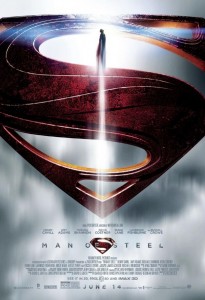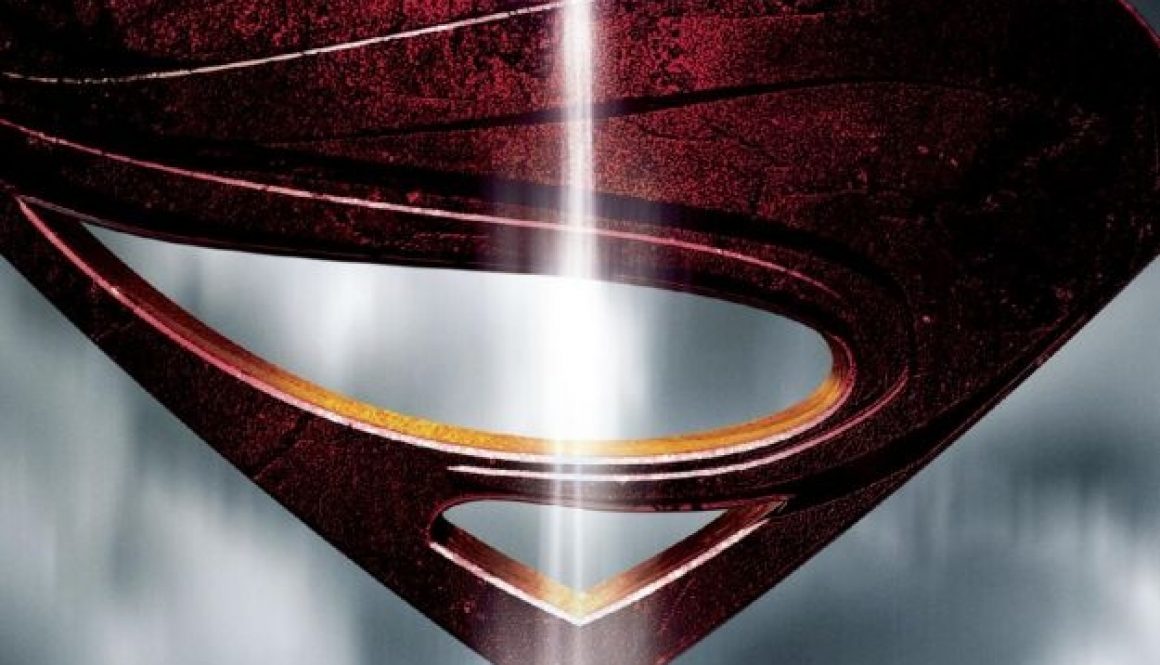Man of Steel: Not the Review I Expected to Write
 So, before I start the review, I have a confession to make. I kind of started composing this in my head days ago, long before seeing the movie. I’d seen all the trailers, and most had failed to move me. They all showcased a Superman who was a cold, brooding outcast. I was sure that Superman in handcuffs was the epitome of Zack Synder’s cynical, nihilistic, hyperkinetic brand of film making. Conventional wisdom on the interwebz was that the movie was a big letdown*.
So, before I start the review, I have a confession to make. I kind of started composing this in my head days ago, long before seeing the movie. I’d seen all the trailers, and most had failed to move me. They all showcased a Superman who was a cold, brooding outcast. I was sure that Superman in handcuffs was the epitome of Zack Synder’s cynical, nihilistic, hyperkinetic brand of film making. Conventional wisdom on the interwebz was that the movie was a big letdown*.
“MoS = PoS,” I even snickered to a friend.
I was happy to be proved wrong. Minor spoilers ahead.
Remember that feeling we all got when watching The Phantom Menace? How fifteen minutes in, the elation of OMG New Star Wars movie was replaced with a gnawing feeling it was a terrible film?** Man of Steel was like that, but in reverse. I went in grumpy, disinterested, ready to hate it. Then I found myself liking it. A lot.
The first part of the film deals heavily with Krypton’s destruction, a civil war, Zod’s coup, and all the things that lead Jor-El into deciding to shoot his only son into space. The Kryptonian design aesethtic is gorgeous, the vistas spectacular, and Russell The Crow turns in a compelling performance as Jor-El. I was always a fan of the Krypton-centric episodes of Superman: The Animated Series,*** so including such a well-realized vision of Krypton really won me over.
It’s at this point, the movie descends into a bit of a mire. Zod & Co. are locked away in the Phantom Zone (which might be a ship, might be hyperspace, I’m a little unclear how they survived Krypton’s eye-popping explosion or how they got back out afterwards). Baby Supes’ pod flies to earth and just before it crashes, we smash cut to adult Clark walking the earth like Kane from Kung Fu, doing good and trying to figure out who he is. It was a rough transition at first, partially because I expected the usual origin story fare. Instead, the young boy discoverying his powers and gaining wisdom from his adopted father, Jonathan Kent, was told in a series of flashbacks throughout the course of the movie. It took me a while, but once I got into the groove of it, I really appreciated the nonlinear aspect of the story. The movie felt a lot less front-loaded as an origin movie than most superhero films do.
It was also an interesting (and very modern) twist to portray Pa Kent as a bit of a naysayer. Traditionally, Kent is always urging his son to become a good man, to do what’s good and right. Make no mistake, he does that here, but in a much more cautious and restrained way. Costner’s Pa Kent knows how paranoid and easily startled modern Americans (earthlings) can be: he’s even willing to die to make his point to Clark: Don’t reveal yourself to them until you –and they–are ready for it.
Henry Cavill brings a lot to the role of Kal-El/Superman. He spends a great deal of the first part of the film casting long, brooding glances off-screen. In the trailers, this made me cringe. I was sure our new filmic Superman was cast too much in the Bale Batman mold, and with Nolan’s fingerprints all over the production this could only lead to bad things. But as depicted in the film, Superman’s struggle to come to grips with being a god among humans played really well. It’s an aspect of his character that is only occasionally emphasized in the comics (and perhaps not as much as his “Boy Scout” persona) but it’s an absolutely essential part of who he is.
Cavill’s performance echoes the classic Reeve Superman with his calm, quiet interactions with the people of Earth. There’s authority, of course, in his insistence that we play by his rules, but also a deep, abiding reassurance that he is here for the greater good of all of us. That sounds very parental (and even paternal, I know), but Superman has always been on our side. And he always will be.
Michael Shannon’s General Zod is at least as compelling as Stamp’s from Superman II, though much better rounded and occasionally even a little sympathetic. He, too, is trying to do the “greatest good” for his people, only his methods differ radically from Kal-El’s. Also, all the Kryptonian tech was very cool. I might have mentioned that before…
My review’s starting to get a little long, so I’ll just mention a few other things I really liked: the ancient Kryptonian ship in the ice (nod to the Fortress of Solitude?), Jor-El as a helpful, passionate hologram (his tutelary recap of Kryptonian history as an animated metallic mural in a WPA style? Squeeeeee), Jenny Olson! the way the movie acted as an origin story for Clark Kent as much as Superman.
The visual effects were stunning (big kudos to my colleagues who worked on it, it’s gorgeous), but at times veered into just plain over the top. I know Snyder can’t help but play with ALL THE TOYS, but especially after seeing Star Trek into Darkness, I have a lower tolerance these days for stuff happening so damn fast. And hey, you kids. Get off my lawn.
Besides the relentless action, the overall tone of the film was sometimes too weighty, too serious. There were some nice light touches, but not often enough. Fortunately, it never descended into the melodramatic introspection that the Nolan Batman films were wont to do. Another minor nit to pick was Zimmer’s score. Mostly, it was beautiful, but as with the Batman films, the score had a lot of rising notes that never quite coalesced into an iconic theme. I guess they are trying to avoid the inevitable comparison to John Williams’ Superman theme, or Danny Elfman’s Batman. Still, would it kill Zimmer to pay off those awesome rising notes for once? 🙂
Overall, I recommend Man of Steel, but don’t take it as seriously as it takes itself, and you might just enjoy the ride.

